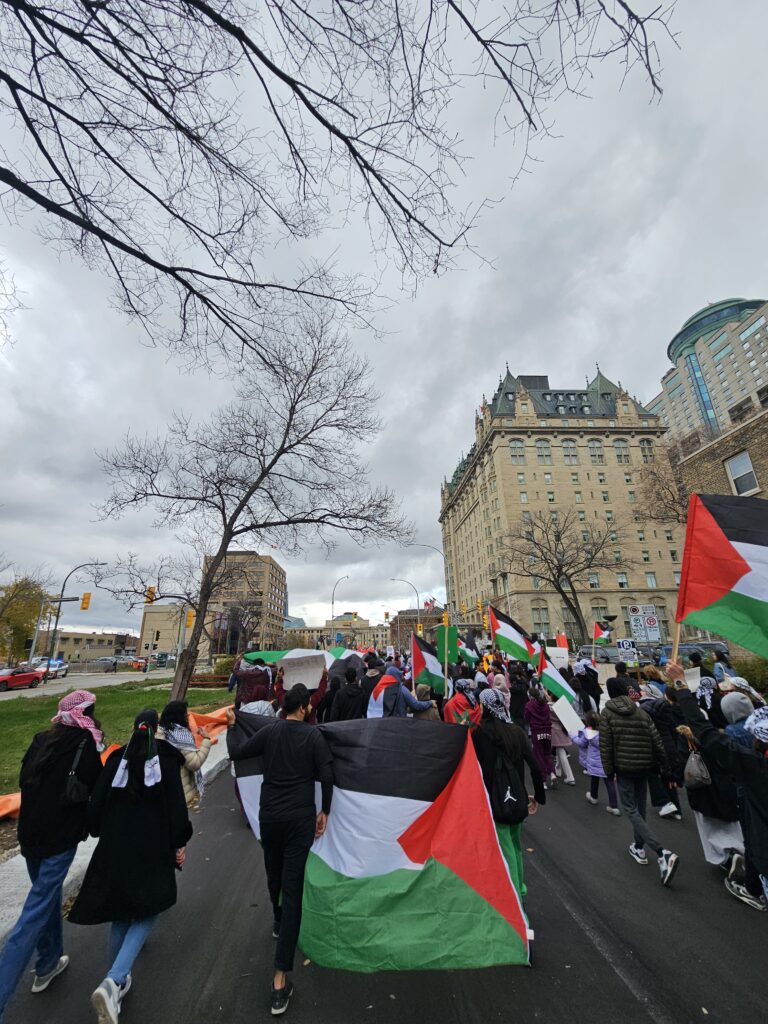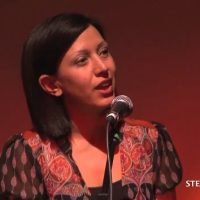Two social causes came together on Oct. 21 in Winnipeg. The first was a No Space for Hate rally held at the Manitoba Legislative Grounds to advocate for transgender youth and 2SLGBTQ+ rights. Across the street at Memorial Park, an All Out for Palestine event was organized to call attention to the Israeli occupation of Palestine and the intensifying genocide in Gaza since Oct. 7.
Like many others that day, I attended both demonstrations, chanting, listening, and marching along. One side of my sign read “FREE PALESTINE” while the other read “PROTECT TRANS KIDS.” It shouldn’t be controversial to affirm Palestinian and transgender self-determination, but it is.
One side of my sign read “FREE PALESTINE” while the other read “PROTECT TRANS KIDS.”
The No Space for Hate rally was a counter-protest to 1 Million March 4 Children, a demonstration happening simultaneously in Winnipeg at City Hall and across Canada and the United States in opposition to “gender ideology” in schools.
Counter-protesters to the Palestine demonstration were present in a small group in between the crowds of 2SLGBTQ+ protesters and Palestinian protesters. They huddled with Israeli flags and a microphone repeating the word “shame!” with the police by their side.
I let their insignificant words drown out as I faced the legislative building, listening to trans speakers celebrate trans youth, lament trans death, and express words of solidarity with Palestine. I crossed the street and continued to deflect the anti-Palestinian shaming, as I lined up with Palestinians, Arabs, Muslims, and allies chanting back, “Shame on YOU, Shame on YOU.”

Together in one afternoon, my identities as a queer Lebanese person came together, nourishing weeks and years of grief and fragmentation. While the struggle for a Free Palestine and trans youth’s self-determination relates to my communities, it is not only about me. It is about trans youths’ right to live (as themselves); Palestinians’ right to live (on their land). Both of these movements advocate for agency, liberation, and basic human rights that should not be contested.
Winnipeg-based artist and poet Azka Ahmed said in their No Space for Hate address to the crowd that those driven by transphobia and prejudice “are protesting to exclude and erase queer identities; they are the ones indoctrinating their children with hate and bigotry.”
“How many lives are lost to transphobia, how many lives are lost because of hate?” Ahmed continued. “That hate is blood on their hands, and their refusal to acknowledge the worth and dignity of every human being is a deep-rooted bias that colonialism has left behind.”
Another speaker and activist, Misha Falk, said in her speech that “every trans suicide is a preventable instance of social murder by negligence.” She called on the audience to avoid assimilation and called out the medical system, the cops, and so-called allies for killing trans people. Both Falk and Ahmed spoke frankly about the negative realities for trans people today while also celebrating transness.
“We teach life” – Rafeef Ziadah
As I was reflecting on the overlaps between the two demonstrations, I came across a video of Canadian Palestinian spoken word artist Rafeef Ziadah performing “We Teach Life, Sir” in 2011. The poem, which centred on the 2008-2009 Israeli bombing of Gaza, was written in response to an absurd question from a journalist that Ziadah received: “Don’t you think it would all be fine if you just stopped teaching your children to hate?”
Ziadah’s poem is a profound expression of refusal—both to the xenophobic, Islamophobic narrative of Palestinians as terrorists, and to the expectation of the perfect victim (for more on this, see Hala Alyan’s piece in The New York Times, “Why Must Palestinians Audition for Your Empathy?,” now renamed “The Palestinian Double Standard”).
“Today, my body was a TV’d massacre that had to fit into sound-bites and word limits filled enough with statistics to counter measured response,” utters Ziadah. Her poem rejects the reporter’s question by affirming Palestinian resilience. “We Palestinians teach life after they have occupied the last sky,” she says. “We teach life after they have built their settlements and apartheid walls, after the last skies. We teach life, sir.”
I let the cadence of Ziadah’s defiance sink into my body. To teach life is to decolonize our understandings of land, love, and identity. To teach life is to refuse assimilation and fight for one another. I see now, how in the struggle for liberation—despite enormous grief, rage, and injustice—both my communities teach life.
Editor’s Muse column by Christina Hajjar
Christina Hajjar is a queer femme first-generation Lebanese artist, writer, and cultural worker based in Winnipeg on Treaty 1 Territory. She is passionate about independent publishing, self-publishing, and print media. In addition to being the Managing Editor of Herizons, Hajjar is also co-editor of Carnation Zine (on diaspora and displacement) and qumra journal (on world cinema). Her writing has appeared in BlackFlash Magazine, C Magazine, The Uniter, and CV2. Learn more at christinahajjar.com.

